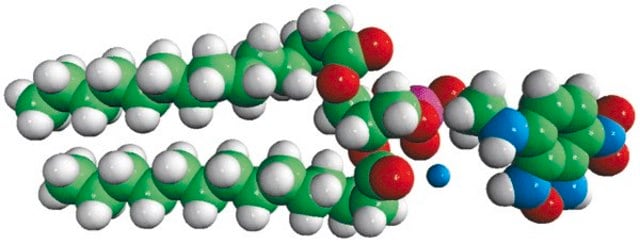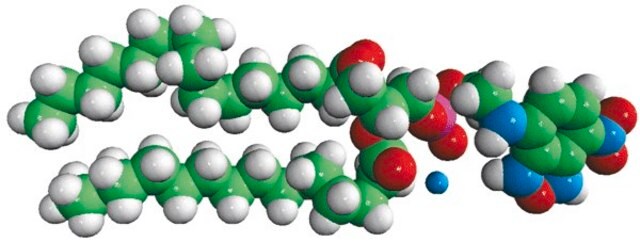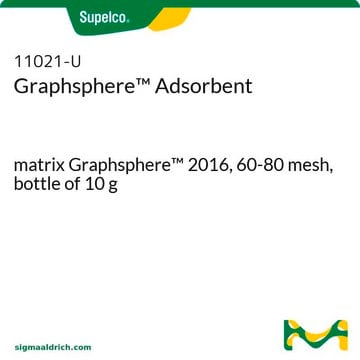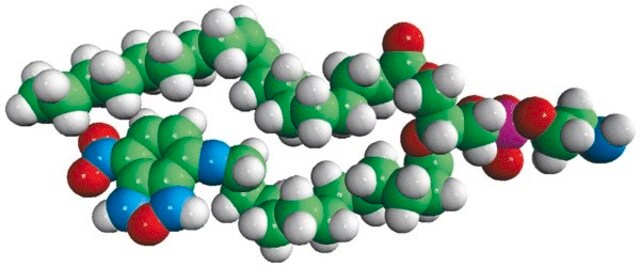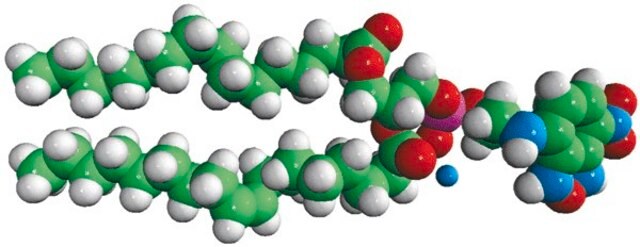810143P
Avanti
14:0 NBD PE
Avanti Research™ - A Croda Brand 810143P, powder
Synonym(s):
1,2-dimyristoyl-sn-glycero-3-phosphoethanolamine-N-(7-nitro-2-1,3-benzoxadiazol-4-yl) (ammonium salt)
Sign Into View Organizational & Contract Pricing
All Photos(2)
About This Item
Empirical Formula (Hill Notation):
C39H70N5O11P
CAS Number:
Molecular Weight:
815.97
MDL number:
UNSPSC Code:
12352211
NACRES:
NA.25
Recommended Products
Assay
>99% (TLC)
form
powder
packaging
pkg of 1 × 1 mg (810143P-1mg)
pkg of 5 × 1 mg (810143P-5mg)
manufacturer/tradename
Avanti Research™ - A Croda Brand 810143P
shipped in
dry ice
storage temp.
−20°C
General description
N-(7-nitrobenz-2-oxa-1,3-diazol-4-yl) phosphoethanolamine (NBD PE) is a fluorescently labeled lipid localized at the membrane interface. Phosphoethanolamine is the second most abundant, metabolically related aminophospholipid. It is mostly enriched in brain.
Application
14:0 NBD PE may be used in the lipid mixing assay for the preparation of phospholipid vesicles and to study its non-equilibrium and equilibrium variations in thermodynamic state of the lipid-water-interface
Biochem/physiol Actions
Phosphoethanolamine of cardiac myocytes is known to prevent cellular damage after ischemia. N-(7-nitrobenz-2-oxa-1,3-diazol-4-yl) phosphoethanolamine (NBD PE) contributes to the Red edge excitation shift (REES) effect monitoring because of its unique motional and dielectric properties.
Packaging
5 mL Amber Glass Screw Cap Vial (810143P-1mg)
5 mL Amber Glass Screw Cap Vial (810143P-5mg)
Legal Information
Avanti Research is a trademark of Avanti Polar Lipids, LLC
Storage Class Code
11 - Combustible Solids
Choose from one of the most recent versions:
Certificates of Analysis (COA)
Lot/Batch Number
Sorry, we don't have COAs for this product available online at this time.
If you need assistance, please contact Customer Support.
Already Own This Product?
Find documentation for the products that you have recently purchased in the Document Library.
In vitro Membrane Interaction and Liposome Fusion Assays Using Recombinant Hepatitis C Virus Envelope Protein E2
Shrivastava S and Schneider MF
Bio-protocol, 8(23), 543-554 (2018)
Application of NBD-labeled lipids in membrane and cell biology
Fluorescent methods to study biological membranes, 37-50 (2012)
Shamit Shrivastava et al.
PloS one, 8(7), e67524-e67524 (2013-07-19)
Fluorescent dyes are vital for studying static and dynamic patterns and pattern formation in cell biology. Emission properties of the dyes incorporated in a biological interface are known to be sensitive to their local environment. We report that the fluorescence
Jean E Vance et al.
Biochimica et biophysica acta, 1831(3), 543-554 (2012-09-11)
Phosphatidylserine (PS) and phosphatidylethanolamine (PE) are metabolically related membrane aminophospholipids. In mammalian cells, PS is required for targeting and function of several intracellular signaling proteins. Moreover, PS is asymmetrically distributed in the plasma membrane. Although PS is highly enriched in
Our team of scientists has experience in all areas of research including Life Science, Material Science, Chemical Synthesis, Chromatography, Analytical and many others.
Contact Technical Service

